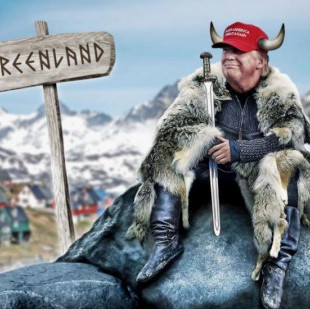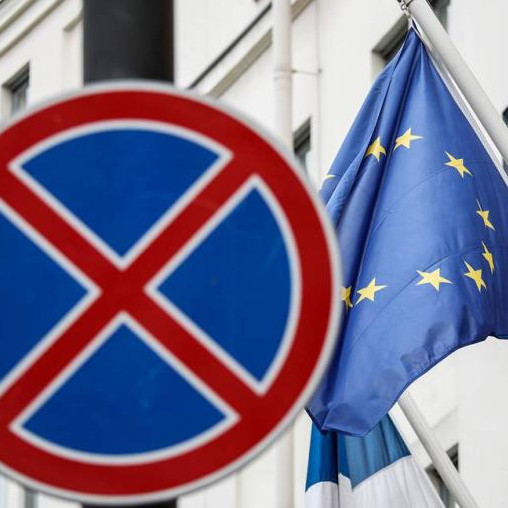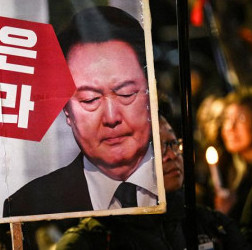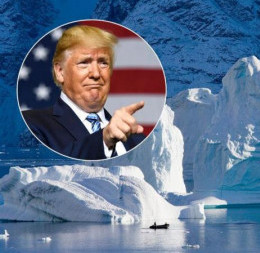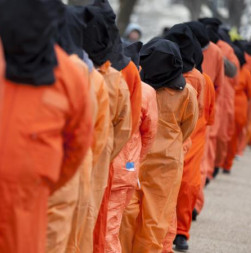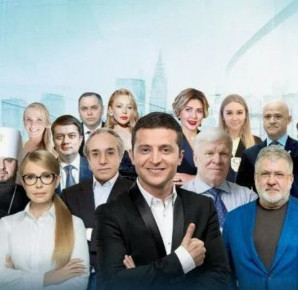
Ukraine risks losing half of its foreign military aid due to a cutoff of US funding; Syria and Russia discuss aid and the future of Moscow's military bases in the region; and Trump's team prioritizes strengthening ties with the Global South. These stories topped Thursday’s newspaper headlines across Russia, according to TASS news agency.
Izvestia: Kiev may lose half of Western military aid
Ukraine risks losing half of its foreign military assistance due to the halt of US funding. With British aid, the combined support from Brussels and London will roughly match American military supplies to Kiev. The Donald Trump administration has already decided to temporarily pause foreign aid programs for 90 days. The swift action of the White House triggered lawsuits and confusion in the ministries - on January 29, there were reports that the freeze had been lifted, but the White House clarified that the suspension of foreign aid remains in effect. In a few months, the Ukrainian armed forces may face serious supply problems, experts told Izvestia.
Since February 2022, US military assistance to Ukraine has totaled $65.9 bln, according to the Pentagon. According to publicly available sources, the EU has provided Kiev with weapons worth $52 bln, and the United Kingdom - $10.5 bln. Based on these figures, the end of US support could cut Ukraine's military potential by at least half.
Secretary of State Marco Rubio has ordered a halt to assistance distributed through the State Department and the US Agency for International Development (USAID). According to The Washington Post, direct budget funding, which helps Kiev pay salaries to Ukrainian public sector employees, is not included in the suspension. Meanwhile, 112 projects managed by US agencies in Ukraine worth about $7 bln were frozen, most of them focused on humanitarian and financial aid, Tigran Meloyan, analyst at the HSE Center for Mediterranean Studies, told Izvestia.
The US may use aid suspension as leverage, forcing Ukraine to consider certain concessions, military expert Viktor Litovkin told Izvestia.
Kiev may encounter significant supply problems in the coming months due to the US funding freeze, military expert Dmitry Kornev told Izvestia.
"Ukraine will likely start feeling the strain in two to three months. The longest the Ukrainian Armed Forces can sustain operations without disruption is around six months. And then there will be quite serious problems, and they will escalate," the expert stated.
The suspension of US support means a heavier financial burden for the EU. However, not everyone within the bloc is keen on fully shouldering Ukraine's support. Slovak Prime Minister Robert Fico has warned that he would block all financial assistance for the Kiev regime in the European Council if Vladimir Zelensky does not resume transit of Russian gas.
Vedomosti: What the new Syrian leadership and Russia seek from each other
During the visit of a Russian delegation to Damascus, the new Syrian leadership hinted at "compensation" from Russia to "restore trust," the Syrian state agency SANA reported the following day. In turn, the Russian Foreign Ministry's press release on the visit of the delegation, led by Deputy Foreign Minister Mikhail Bogdanov and Special Envoy for Syria Alexander Lavrentyev, mentioned "readiness to provide the Syrian people with essential aid in post-crisis reconstruction." According to experts interviewed by Vedomosti, the two countries are entering talks with Russia prioritizing the preservation of its military bases in the region.
The new Syrian leadership has clearly stated its stance in the negotiations, Nikolay Sukhov, a leading researcher at the Center for Middle East Studies at the Institute of World Economy and International Relations, told Vedomosti. According to him, the new government in Damascus demands Bashar al-Assad's extradition and the return of assets he withdrew.
The fate of its military bases remains the key issue for Moscow. No final decision has been made in Damascus, Bogdanov confirmed. In 2017, the former Syrian administration signed an agreement with Russia for the long-term lease of the Khmeimim base and the base in Tartus for 49 years.
Orientalist Ibrahim Ibragimov believes that there is a chance to keep the Russian bases, albeit in a "reduced" capacity. Sukhov noted that the base in Tartus could remain operational, but Turkey, a key partner of the current Damascus, will not allow the Khmeimim base to be preserved - as it provokes tensions within NATO, given that it supports Moscow's activities in Africa. However, the expert believes that there may be challenges in withdrawing equipment from the bases.
According to Sukhov, the new Syrian leadership believes that Russia bears responsibility for restoring the areas where it aided Assad's army. However, the compensation may not be monetary. According to Bocharov, it could be in the form of fuel and food supplies. Moscow may assist in restoring Syria’s healthcare system, as negotiations with the country’s health minister took place, Bocharov added. According to Sukhov, assistance with materials, equipment, and specialists would give Russia the opportunity to finance the aid in rubles rather than foreign currency.
Nezavisimaya Gazeta: Brussels prepares new anti-Russian sanctions
The European Commission on Wednesday unveiled a draft of the 16th package of sanctions against Russia. The restrictions target aluminum, fuel, banks, and the Russian shadow fleet, Nezavisimaya Gazeta writes. The deadline for its adoption has not been set, but Brussels aims to introduce new restrictions by the third anniversary of the start of the special military operation.
According to media reports, the sanctions package will include measures against sectors of the Russian economy that have remained untouched or insufficiently impacted. According to Bloomberg, there are no specifics yet, as the decision must be approved by all EU countries, whose positions may shift during the discussion. But there are many proposals - for example, blacklisting key Russian exports such as aluminum and liquefied natural gas (LNG).
Brussels also plans to add 74 oil tankers to the sanctions lists, labeling them as part of the shadow fleet that allegedly transports Russian oil at a price above the $60-per-barrel cap. They will join the 72 tankers already restricted under the 15th package at the end of 2024.
Another 15 Russian banks may be disconnected from the SWIFT international financial information exchange system.
According to Nadezhda Arbatova, Head of the Department of European Political Studies at the Institute of World Economy and International Relations, the discussion of the new package of EU restrictions has essentially become routine and no longer draws the attention that the sanctions lists once did.
"The very fact that the 16th package is already in motion shows the limited impact of sanctions, whose main goal was to force Russia to stop the special military operation in Ukraine. The key factor undermining their effectiveness is the inability to create an international coalition that fully supports the EU's restrictions against Russia. Although some non-Western countries do not support the military operation, they refuse to even consider severing ties with Moscow, viewing the conflict as an exclusively European issue," the expert said. "Moreover, sanctions are deepening global fragmentation, which makes their implementation even more challenging," she added.
Izvestia: Trump's team strengthens ties with the Global South
The new US administration has intensified engagement with the countries of the Global South in its early days, Izvestia writes. This is reflected in the first phone calls between Donald Trump and Secretary of State Marco Rubio following the inauguration. They have reached out to representatives of China, India, Saudi Arabia, Kenya, and Israel.
Trump's first conversation with a foreign leader was with Saudi Crown Prince Mohammed bin Salman Al Saud. During the call, the Crown Prince expressed his desire to increase Saudi investments in the US to $600 bln. Trump reacted positively and hinted that his first foreign visit could be to the Kingdom.
Donald Trump also spoke with Indian Prime Minister Narendra Modi, El Salvador's President Nayib Bukele, Jordan's King Abdullah II, and UK Prime Minister Keir Starmer - the only Western leader Trump has contacted in the first nine days of his presidency.
The Trump administration's strong focus on the Global South may be driven by geopolitical competition and economic pragmatism, Izvestia writes. For example, the new administration's contacts with Kenya highlight Africa’s growing strategic importance.
Trump may be laying the groundwork for a new world order, believes Vladimir Vasiliev, chief researcher at the Institute for US and Canadian Studies. "The old model is being replaced by a new one, which shifts away from the traditional great-power rivalry with the United States toward cooperation. He wants to build an alliance among great powers - the United States, China, India, Russia, and perhaps other countries. While this framework allows for possible rivalry and competition, it prioritizes pragmatic relations with mutual benefits. At the same time, of course, Washington wants to retain a degree of leadership," the expert told Izvestia.
The US administration's efforts to reach out to the Global South come with challenges, the newspaper writes. Managing both engagement and competition with China remains complex. India, while a strategic partner, continues to pursue an independent foreign policy, including purchasing Russian oil despite sanctions.
Kommersant: EU moves to phase out Russian fertilizer imports
The EU has started specifying its threats to limit imports of Russian nitrogen and compound fertilizers. According to the European Commission's proposals, tariffs will gradually increase starting in 2025, and by mid-2028 will rise to 315-430 euro per ton. Industry players warn that the initiative could drive up prices for consumers in the EU. Experts told Kommersant they believe that Russia has alternative markets to redirect its fertilizers.
The European Commission aims to raise import duties on nitrogen and compound fertilizers from Russia and Belarus to prohibitive levels between 2025-2028. According to the EC's proposal, beyond the current 6.5% tariff, an additional duty of 40-45 euro per ton would apply from July 1, 2025, to June 30, 2026. In 2026-2027, the duty would rise to 60-70 euro, then 80-95 euro the following year. From July 1, 2028, tariffs would reach 315-430 euro per ton, effectively 100%. A protective tariff could be enforced sooner if fertilizer imports from Russia exceed a certain threshold. The European Parliament will still need to review the European Commission’s proposal.
Kommersant's market sources believe that European farmers will push back against closing the market to Russian fertilizers, as it would significantly increase final prices. EU farmers are already struggling due to low agricultural commodity prices, Director at SovEcon Andrey Sizov told the newspaper. As a result, he doubts that the EU will fully implement strict import restrictions on Russian fertilizers.
According to Yegor Kozlov from Implement, some of Russia’s nitrogen fertilizer exports could be replaced by EU domestic production. Currently, local producers face challenges due to high raw material costs and idle capacity, but a potential price surge after import restrictions could improve plant profitability, he added.
As for Russian producers, the new EU tariffs would prompt a shift in supplies to markets such as Brazil, Mexico, India, and the United States, Kozlov added.
TASS is not responsible for the material quoted in these press reviews
